Thatcher understood Washington’s 1989 invasion was illegal but supported it anyway, recently declassified documents show, John McEvoy reports.
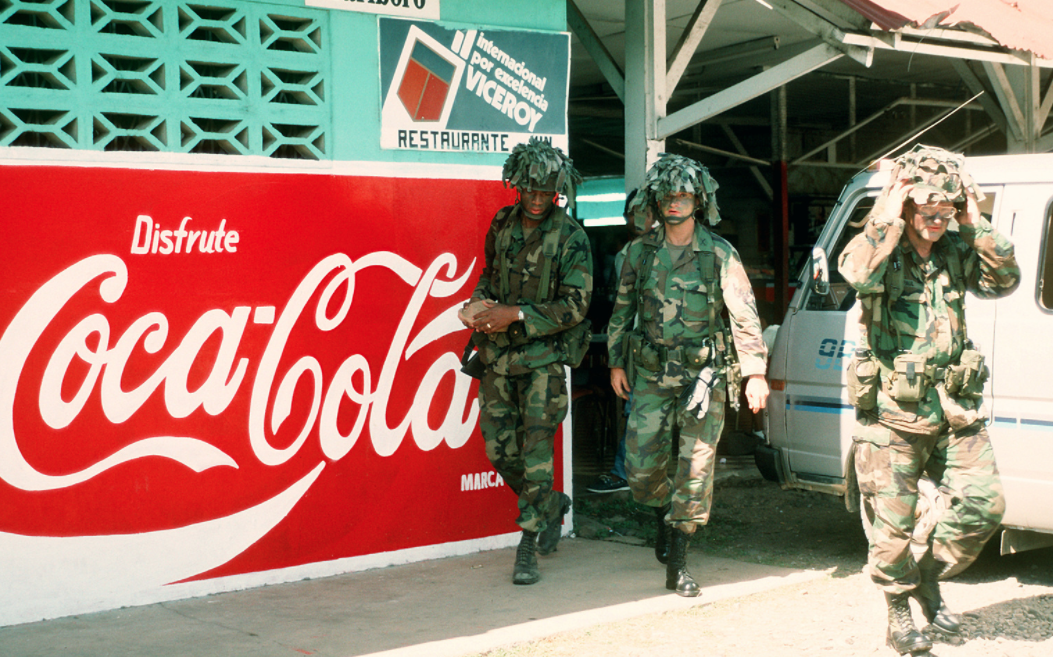
Jan. 1, 1990: U.S. soldiers in Panama during the invasion. (U.S. National Archives)
By John McEvoy
Declassified UK
 Shortly before 7 a.m. on Dec. 20, 1989, Margaret Thatcher received a call from U.S. President George H.W. Bush.
Shortly before 7 a.m. on Dec. 20, 1989, Margaret Thatcher received a call from U.S. President George H.W. Bush.
Bush informed the U.K. prime minister that Washington had just launched an invasion of Panama, declaring that there had been “no alternative but to intervene.”
After decades on the C.I.A.’s payroll, Panama’s military leader Manuel Antonio Noriega had fallen out of favour with the White House, and the Bush administration decided it was time for him to go.
That morning, over 20,000 U.S. troops descended on Panama, accompanied by the indiscriminate bombing of poor civilian areas thought to be Noriega strong-holds.
According to human rights organisations, up to 3,000 Panamanian civilians may have been killed during the invasion, with tens of thousands more displaced. The true figure of civilian casualties remains unknown — the U.S. forces didn’t bother to count the dead, with many thrown into mass graves.
Thatcher was the first foreign leader to be told of the operation.
Over the phone, she assured Bush that “it was a very courageous decision which would have our full support.” Britain would “take the line that it was no good people criticising Noriega and then failing to support the Americans”.
Over the following weeks, the Thatcher government stood alone in its unequivocal support for the U.S., despite concerns over the legality of the invasion. “Bang — just like that,” was how Thatcher described her decision to back Bush.
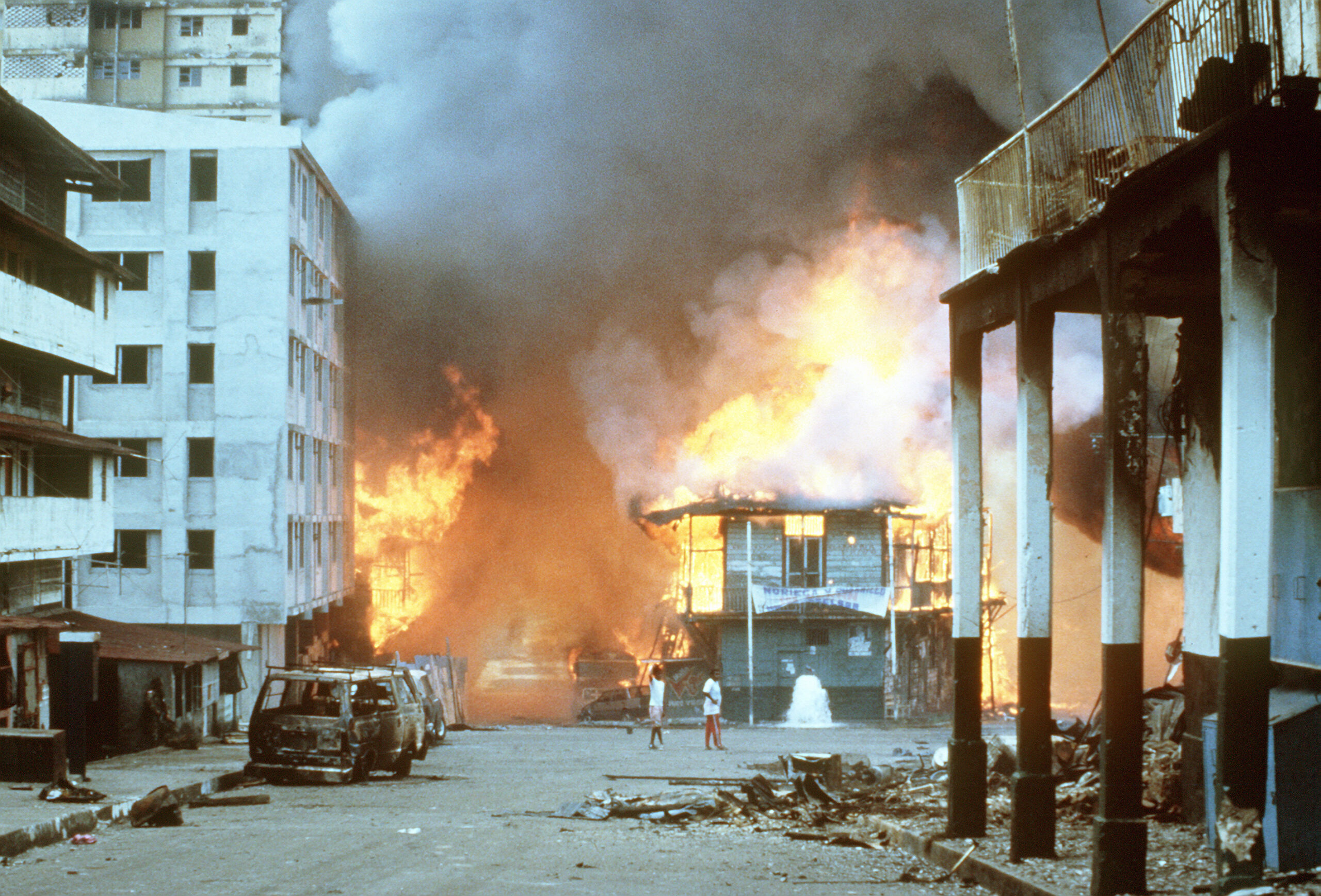
U.S. military invasion of Panama in 1989. (Wikimedia Commons)
From Asset to Liability
The White House had not always treated Noriega as an adversary.
Throughout the Cold War, he had been a valuable C.I.A. asset – from snitching on Peruvian military students in the 1950s to running covert operations in support of the Contras’ war against the Nicaraguan government in the 1980s.
In June 1986, however, journalist Seymour Hersh revealed that the Panamanian military leader was “extensively involved in illicit money laundering and drug activities.” On top of this, Noriega had been “providing intelligence information simultaneously to Cuba and the United States.”
Public knowledge of Noriega’s drug links turned him from an asset to a liability, and the White House came under increasing pressure to act. Moreover, Noriega’s links with Cuban intelligence suggested he could no longer be trusted to do Washington’s bidding — a serious concern given the strategic importance of the Panama Canal.

Panama’s Gen. Manuel Noriega being taken onto a U.S. Air Force aircraft by agents from the U.S. Drug Enforcement Agency after his arrest on Jan. 1, 1990. (U.S Air Force, Public Domain, Wikimedia Commons)
Still, three months after Noriega’s drug links were revealed, the Panamanian leader met with U.S. National Security Council official Oliver North in a London hotel “to collaborate on a plan for Noriega to support the Contras in return for American money and arms.”
In response to a Freedom of Information request, the U.K. Foreign Office claimed that it holds no record of Noriega’s visit to the U.K. However, it seems unlikely that British intelligence knew nothing of what was happening.
The Lady is for Turning
By the time of Bush’s election in November 1988, the U.S. had decidedly turned on Noriega. That year, the Ronald Reagan administration imposed crippling sanctions on Panama and indicted Noriega on drug-trafficking offences.
Even as Washington turned up the heat on Noriega, the British government opposed both military intervention and sanctions.
In September 1989, Thatcher held a meeting in Downing Street with Panamanian opposition figure Guillermo Ford and agreed with him that the international community should continue to ostracise Noriega.
But “she did not think intervention would be the right way forward. It would do the United States no good in Latin America. Nor did she think violence within Panama would help.”
Thatcher added that “the best way to get rid of Noriega was by constant pressure from opinion both from inside Panama and from other governments.”
The same month, a private U.K. foreign office brief recommended that Foreign Secretary John Major explain to the U.S. “our objection to economic sanctions” on Panama: “generalised economic sanctions would serve no purpose; hurt the innocent more than the guilty.”
Thatcher’s opposition to intervention in Panama would not last — the lady, it seems, was for turning.
‘Operation Just Cause’
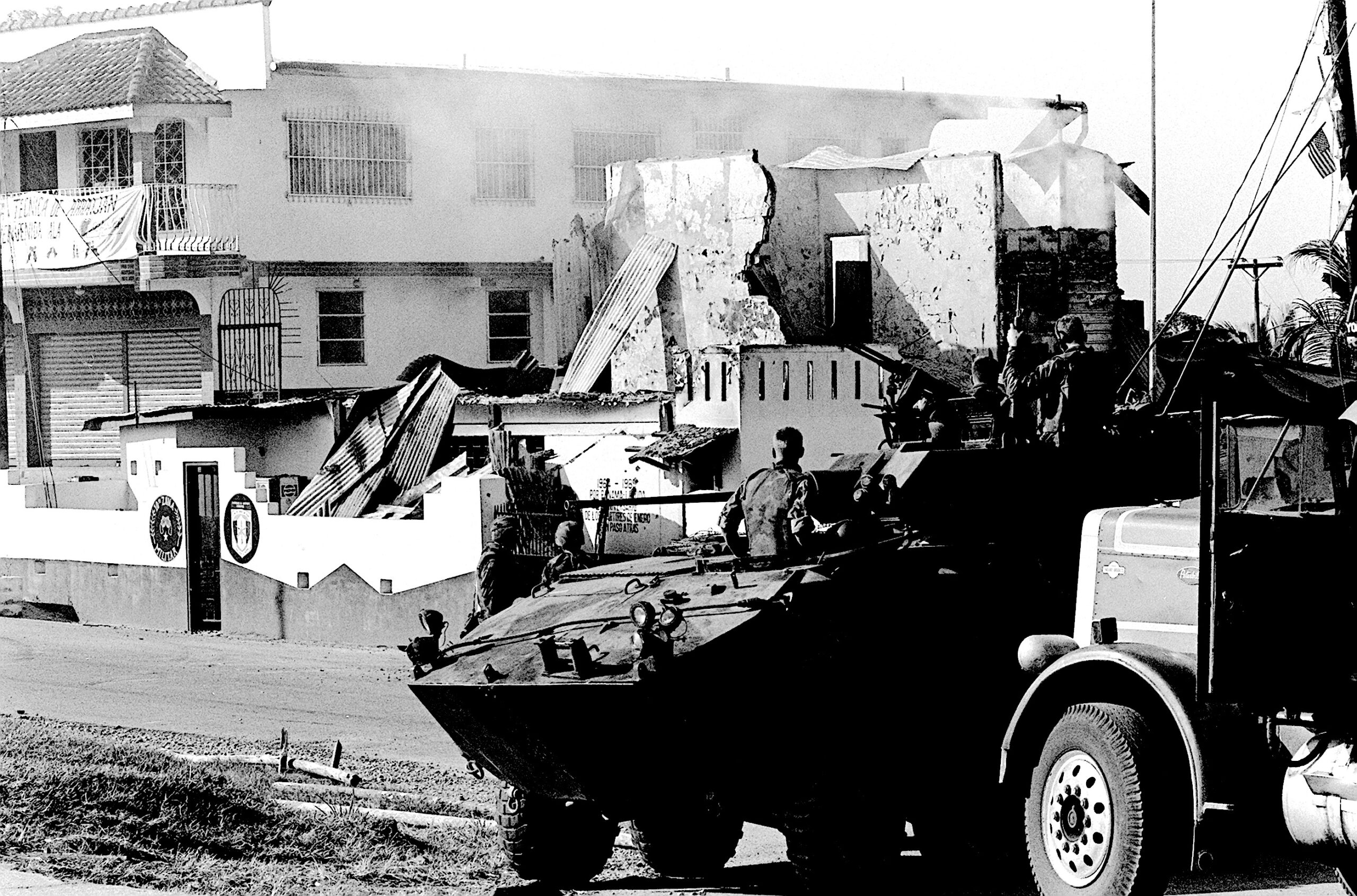
U.S. Marines outside a destroyed Panamanian Defense Force building during the first day of the U.S. invasion, Dec. 20, 1989. (DoD, PH1 Elliott, Wikimedia Commons)
On Dec. 20, 1989, Bush launched “Operation Just Cause,” justifying the invasion of Panama on four grounds: to restore democracy to Panama; to arrest Noriega; to protect U.S. rights under the Panama Canal Treaty; and to protect U.S. nationals in Panama.
In reality, Noriega’s subservience to the U.S. had come into question, and Bush viewed intervention in Panama as an opportunity to shake off claims that he was a “wimp.” Indeed, Noriega’s election rigging, persecution of political opponents and drug links had not been a serious concern while he worked as a U.S. asset.
On Bush’s orders, the U.S. thus “mesmerised” Panama “with firepower,” using “new gadgets, laser-guided missiles and stealth fighters,” new technologies which the U.S. was “just dying to use,” as U.S. General Marc Cisneros recalled.
Two weeks after the invasion, Noriega surrendered himself to U.S. forces. He was put on trial in a Miami court, which prevented his defence from presenting any evidence relating to his work for the C.I.A., or links with senior U.S. officials including Bush.
Back in Panama, Guillermo Endara was installed as Noriega’s successor. He oversaw the return of competitive elections in Panama, though the country remained a key if not more important player in the Latin American drug trade.
Legal Doubts
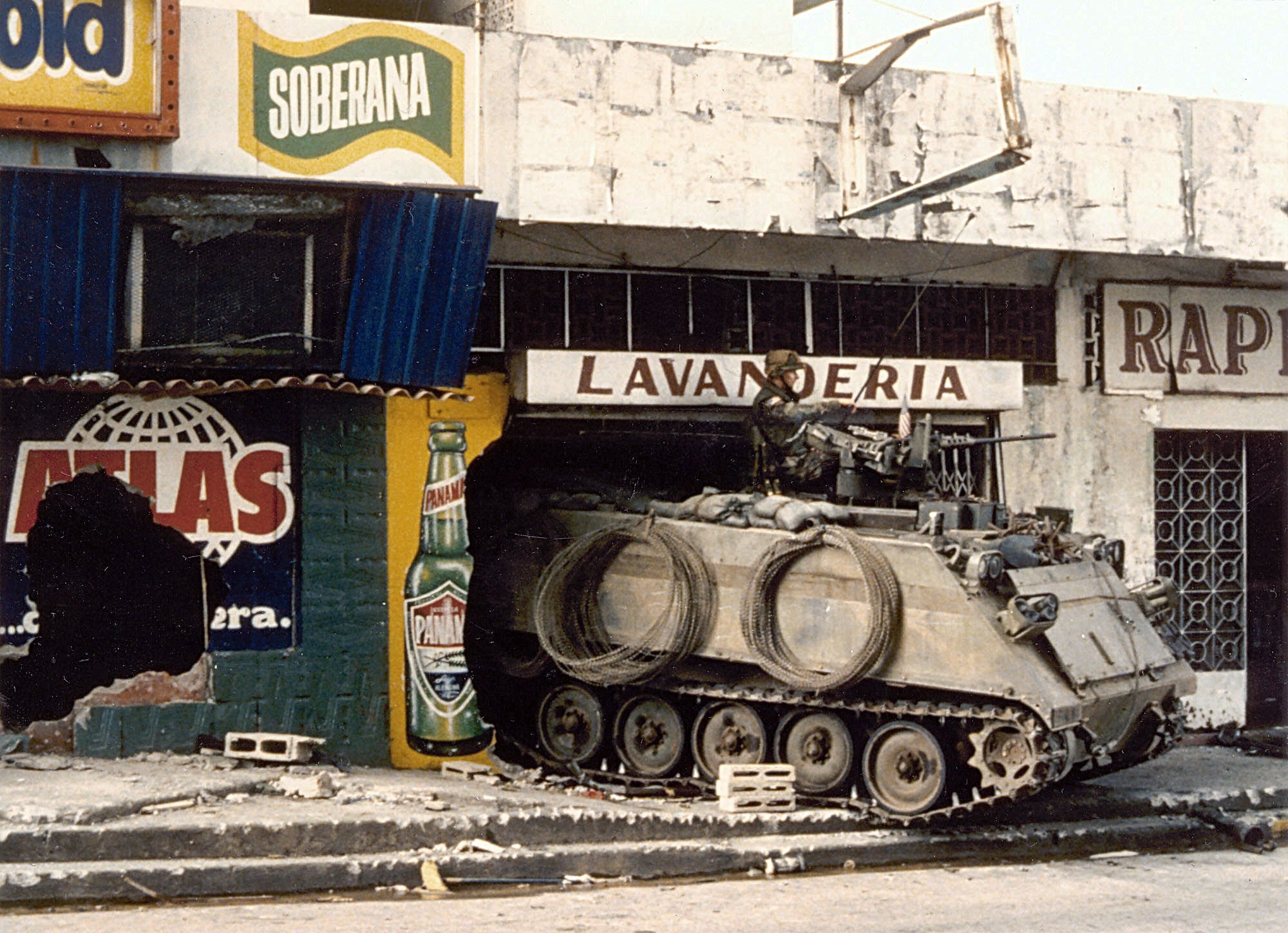
Dec. 21, 1989: U.S. armored personnel carrier guards a street near the destroyed Panamanian Defense Force headquarters building during the second day of the U.S. invasion. (DoD, J. Elliott, Public Domain, Wikimedia Commons)
Even on the grounds given by Bush, British legal advisers doubted whether the invasion could be justified under international law and strongly encouraged officials not to comment on matters of legality.
On the day of the invasion, Foreign Office legal adviser Sir Arthur Watts wrote to Adrian Beamish, the assistant under secretary of state for the Americas, about his concerns.
“On the facts as we know them it is not possible to conclude that the American action was justified in international law,” Watts noted. In particular, he wrote there could be “no justification in international law” for the U.S. claim to be restoring democracy in Panama or for its seizure of Noriega.
He added: “My strong advice is that we should not be drawn into expressing a view one way or the other on the legality of the American action.”
The next year, Anthony Aust, a legal adviser to the U.K. mission to the U.N., compared the U.S. invasion of Panama to that of Grenada in 1983.
“On that occasion also there were four or five different legal grounds given, none of which was convincing on its own. Taken together they were even less convincing,” he wrote.
Indeed, the U.S. invasion of Panama was widely considered to be illegal and in violation of the charters of the United Nations and the Organization of American States.
Washington Was Grateful
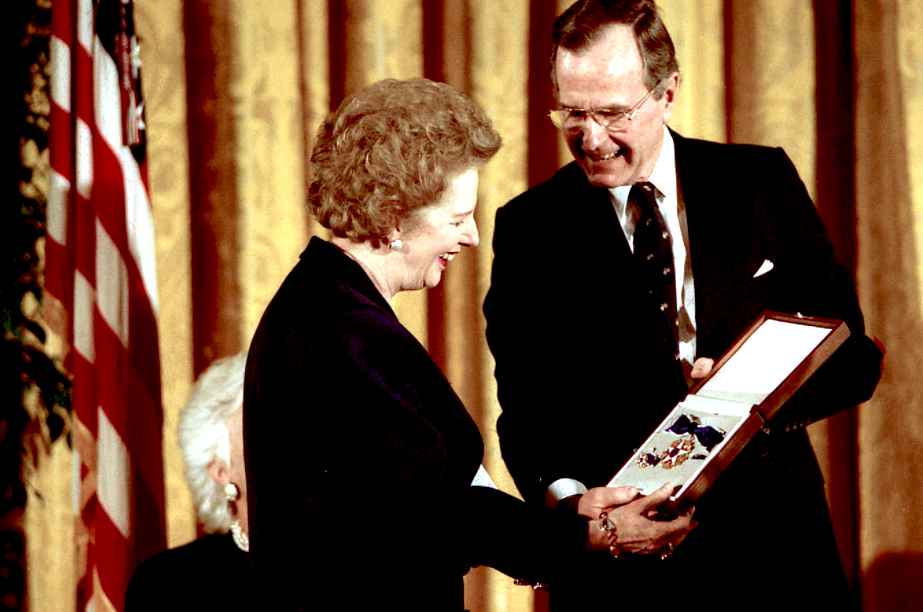
July 3, 1991: President George H. Bush presents the Presidential Medal of Freedom to former British Prime Minister Margaret Thatcher. (U.S. National Archives)
Legal concerns notwithstanding, Thatcher came out batting for the U.S. more than any other political leader.
On the morning of the invasion, the prime minister stood outside Downing Street and told reporters that Bush’s decision to invade had been “courageous,” adding: “I believe this is what friends are for — to support at this time.”
In the following days, Britain vetoed a U.N. Security Council resolution which “strongly deplores the intervention in Panama by the armed forces of the United States of America, which constitutes a flagrant violation of international law and of the independence, sovereignty and territorial integrity of States.”
This was the last time that the U.K. government used its veto at the U.N. Security Council.
Britain’s representative to the U.N., Thomas L. Richardson, declared that the U.K. government “fully support[s] the action taken by the United States,” taking the U.S. at its word that “all feasible measures have been taken to minimise the risk of civilian damage or casualties.”
Washington was grateful.
Shortly after the Security Council vote, it was noted that Britain’s “early and unswerving support for the U.S. intervention went down very well in Washington. Although France joined the U.K. and U.S. in vetoing a hostile Security Council Resolution only we have given unequivocal support to the Americans.”
So unswerving was Britain’s support for the U.S. that Douglas Hurd, then U.K. foreign secretary, privately worried that “it will look as though we are just following the Americans.”
Indeed, this was effectively the case. As Thatcher later recalled: “When President Bush was in trouble about Panama, he rang me, he got support. Bang – just like that… Where else did he get it from?”
John McEvoy is an independent journalist who has written for International History Review, The Canary, Tribune Magazine, Jacobin and Brasil Wire.
This article is from Declassified UK.

A side note: Manuel Noriega was, in those days referred to in the US press as “Strongman Manuel Noriega”.
At the time I thought (tongue & cheek) “Gee. So this guy moonlights as a strongman in the circus and works as a leader in the day?”
No matter what anyone thinks of the guy, it’s slanderous. We see this every day in the mainstream press; they will precede someone’s name—as in a formal noun with a ? biased descriptive. Journalists help me out here. I don’t know the proper term. Recently I saw “conspiracy theorist Alec Jones”. I’ve been thinking about copying every time I see another one and make a list.
They slip these by all of the time. How do they get away with it?
America…the world’s cancer.
Just add Panama to the very long list of illegal invasions by the US. For them to criticize Russia’s illegal invasion of Ukraine is surly the pot calling the kettle black. Britain also has absolutely no moral authority when it comes to illegal invasions of other nations. The Anglo-American project continues. It makes me sick that my country Canada is a major player on the cheerleader team.
Much like, e.g., Saddam Hussein’s Ba’athist Iraq, and the Tito/Informbiro-inspired Yugoslavian socialists that had hitherto been a contrarian thorn in the USSR’s side, Noriega happened to be a Cold War “wild card” that outlived his usefulness to the military-intelligence establishment in the United States circa 1987-92 as the Soviet bloc fell apart, as his mentor, patron, and predecessor Omar Torrijos likely did before him in his suspicious plane crash (possibly via Noriega’s own complicity). Regionally-speaking, the Panamanian military governments of 1968-89 were of a piece with what I have termed “rosa-golpista” (or “pink-coupist”) military governments in other Latin American countries such as Bolivia (1964-71), Peru (1968-80), and arguably Honduras (from at least 1963-75) that were anti-communist authoritarians but embraced Third Worldism, non-alignment, and/or leftist-oriented reforms (see my research article “Reaganites and Rosa-golpistas: Omar Torrijos, Panama-United States Relations, and the Rise of the Reagan Doctrine” from the December 2021 issue of The Latin Americanist journal).
Due to his consolidation of Panamanian politics toward a neoliberal economic model, and most importantly his extensive logistical role in enabling the Contra War and all of the arms-trafficking, narcotics-smuggling activities that entailed, the CIA, USSOUTHCOM, and Co. was originally willing to wave off the likes of Elliott Abrams and the most rabid John Birch Society/American Security Council/World Anti-Communist League true believers’ desire to foment his immediate ouster. In the process, they countenanced Noriega’s longstanding ties to Cuban intelligence and the KGB (alongside the CIA and Mossad, the latter via his closeness with Michael “Mike” Harari of Lillehammer Affair infamy); his initial support of the FMLN in the Salvadoran Civil War alongside Honduran intelligence chief Leónidas Torres Arias, as well as his past role in aiding the Sandinista revolution in Nicaragua against Anastasio Somoza Debayle as Torrijos’s subordinate; his political and financial relationship with other Cold War “wild cards” like Libya’s Muammar Qaddafi; and even his support for the Contadora Initiative to negotiate an end to the various Central American wars.
However, as the Cold War rationale for permitting some unwieldy, ambivalently-aligned leaders to pursue their own agendas on the side declined, unilateral maximalism of the Elliott Abrams variety took its place. US political elites and the media were then happy to mobilize all of the past sins that Noriega had committed with previous US acquiescence or complicity against him. Cue the “hard chargers” of 1989, and the rest is history…
“The killing of a U.S. Marine lieutenant by Panamanian forces last December, an event used by President Bush in part to justify the invasion of Panama, was not the unprovoked act of “aggression” portrayed by the White House, according to American military and civilian sources.
Instead, it was a step in a pattern of aggressive behavior by a small group of U.S. troops who called themselves ‘the Hard Chargers’ and who frequently tested the patience and reaction of Panamanian forces, particularly at roadblocks, the sources said.
[…]
[S]ources here insist that their account is the true one. And although the Pentagon characterizes the accusation as an old story, it has not been publicly circulated.
They added that although ‘the Hard Chargers’ acted on their own, their tactics were well known by ranking U.S. officers, themselves frustrated by what then seemed to be the unwillingness of Washington officials to strike back at Panamanian provocations committed under dictator Manuel A. Noriega.”
Source:
Kenneth Freed, “Some Blame Rogue Band of Marines for Picking Fight, Spurring Panama Invasion,” Los Angeles Times, December 22, 1990
Actually, Noriega’s drug links had become a serious concern — indeed, a liability — on the political side of the U.S. government while still a CIA asset. It was a full year after Hersh’s 1986 exposé that the CIA reportedly took him off its payroll. One should keep in mind that the U.S. bureaucracy includes many parts, which often have conflicting interests and agendas.
It’s also worth noting that the proximate trigger of the U.S. invasion was an event a few days earlier in which a U.S. Marine lieutenant was fatally wounded at a roadblock set up by the Panama Defense Forces, as well as the serious beating of another U.S. military officer who, along with his wife, witnessed the fatal encounter and were detained by the PDF.
As an aside, Noriega, who headed G-2 (military intelligence) under Omar Torrijos, is widely suspected in his death. Torrijos’ independent policy vis-á-vis “the Giant of the North” prompted Graham Greene, his admirer and friend, to tell John Perkins, author of “The New Confessions of an Economic Hitman,” “I fear for his safety.”
Our own government encouraged the drug trade as a deal for assistance in arms trafficking to Nicaragua. The DEA allowed tons of coke to pour into our streets as we traded the weapons to these “Lord’s of war” who gave them to the Contra’s to overthrow the Socialists, thus circumventing congressional law. Naturally we encouraged Noriega to participate in this “deal” which gave us the “excuse” to invade Panama and correct the deal Jimmy Carter made when he gave the Canal back to the government of Panama.
A remarkable deal considering the circumstances and yet another example of US hemispheric control.
HA! I just watched In The Loop, a film with James Gandolfini, which was probably partly based on Britain’s support of that invasion, (and all the other U.S. invasions). Great film. Very relevant today.
Maybe I missed something?
I was drawn to this article by the “recently declassified documents” in the header, but it is not clear what part of this report is newly declassified.
Nonetheless, it is good to be reminded of these events because it is one of the most obvious example of America’s criminal interventions in other nations.
“Throughout the Cold War, he had been a valuable C.I.A. asset…”
Not unlike George H. W. Bush.
His CIA associations may be the reason why Nixon, despite a massive lobbying effort run by Prescott Bush, refused to make George Bush his running mate in 1968. He might have been worth enough votes in Texas to have swung that state Nixon’s way. In the end, he failed there by little over 1%.
Perhaps someone reading this comment could shed some light on the matter.
I assume you may already be familiar with Russ Baker’s three-part series “Watergate Revelations: The Coup Against Nixon” on WhoWhatWhy (or his 2010 book “Family of Secrets” that the series excerpts), but that would likely be a good source to look at to possibly gain further insight on the matter.
declaring that there had been “no alternative but to intervene.”
Rules Based International Order in action.
This was a sick crime by the Washington empire that today often gets glossed over and forgotten about.
The must-see documentary film on this annihilation by Washington is “The Panama Deception.” One of the better documentaries of the past 35 years.
If I recall correctly, I believe it’s the great scholar Michael Parenti, who’s interviewed in the film and remarks that this intervention was Washington’s first major intervention just after the USSR collapsed or was on the brink of imminent collapse. It was Washington’s message to the world: we’ll do whatever the heck we want, if you don’t like it, you’ll also get the Panama treatment.